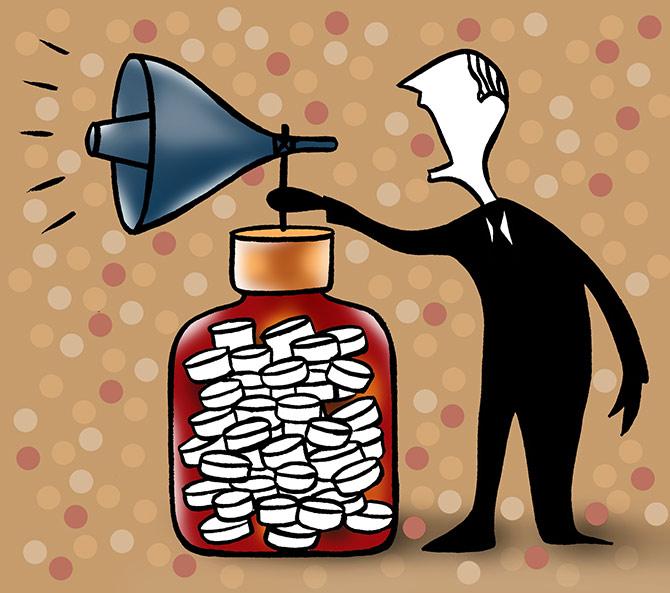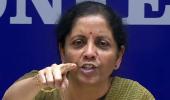The good news is that more diabetes drugs are set to go off patent in the next two to four years, bringing relief to India’s 73-million diabetics.
A chronic patient stands to save around 80 per cent of his monthly cost on these medicines if he switches to home-grown brands.
Illustration: Uttam Ghosh/Rediff.com

Indian cardio-diabetic patients are in for a huge relief as prices of three key diabetes and heart ailment-related drugs have gone off patent this year and home-grown companies have rushed to fill the market with cheaper generic variants of the innovator drugs.
The prices have already dropped by almost 80 per cent in most cases.
The good news is that more diabetes drugs are set to go off patent in the next two to four years, bringing relief to India’s 73-million diabetics.
Swiss multinational Novartis’ Galvus (Vildagliptin) went off patent in December.
From Rs 20-25 per dose (a patient needs two doses per day), the prices have already fallen in the range of Rs 5 and Rs 6 per dose, or about Rs 10 per day for a chronic diabetic patient.
Earlier this month, Ahmedabad’s Eris Lifesciences acquired Zomelis for Vildagliptin-based formulations from Novartis for Rs 93 crore.
The market is heating up.
At least 30 new brands are already available in the market, with almost every major pharma company in the country - Torrent, Zydus, Intas, Lupin, Panacea, Cipla, Zuventus, Emcure - going after this drug.
The market size is estimated to be roughly around Rs 900 crore or so (along with its combination with Metformin, another diabetes drug).
Another cardiac drug Ticagrelor (AstraZeneca sells as Brilinta) went off patent this year.
And Bristol-Myers Squibb’s Apixaban (brand name Eliquis) is under litigation related to a timeline for patent expiry.
One patent expires this month, but the innovator had claimed that another one protects it till September 2022.
Hyderabad’s Natco Pharma has already tried to launch a generic Apixaban (named Apigat) and the matter went to Delhi high court.
“Domestic companies are ready with their generic versions of Apixaban and most would be launching it using the same route as Natco,” said a senior official of a Mumbai-based company launching the product.
Ticagrelor is a platelet aggregation inhibitor or a blood thinner.
It is prescribed to patients with a history of cardiac illness to reduce the chances of a heart attack.
Apixaban also reduces blood clotting and reduces the chances of a stroke.
Ticagrelor was roughly priced around Rs 55 per dose.
The prices have come down to as low as Rs 12, claimed industry insiders, with the average price at Rs 20 per dose.
Similarly, Apixaban prices have come down from Rs 70 to Rs 12 per dose.
A chronic patient stands to save around 80 per cent of his monthly cost on these medicines if he switches to home-grown brands.
“The innovator companies, too, have slashed their prices, but they would still continue to command a premium pricing as they are the innovators.
"Doctors who prefer to prescribe innovator brands may continue to do so.
"Even then the patient stands to benefit, saving anything between 40 per cent and 50 per cent,” said the head of cardio-diabetic and drug licensing division of a leading pharma company.
Will there be a price war?
A senior official of a Mumbai-based drug firm said he does not think so.
Another diabetes drug Teneligliptin (Mitsubishi Pharma drug) had seen a major bloodbath in the domestic pharma market after the patent expired.
While Glenmark was the first to launch the generic version in June 2015 for Rs 19.9 per dose, soon at least 100 brands followed, with prices crashing to almost Rs 6-7 per dose.
“Gliptins were available for Rs 40-45 a dose prior to Teneligliptin.
"When the patent expired, the initial prices fell to a third of the innovator price.
"Pharma companies thought it was a substantial reduction and the first movers did brisk business.
"The later entrants did not have any other strategy, but to have a pricing advantage and the prices continued to fall,” he explained.
Teneligliptin was also not backed by good clinical data, which also made pricing the main strategy for companies to push the drug.
But, the case for Vildagliptin is likely to be different - it has established efficacies and it is likely to eat into the Rs 600-crore Teneligliptin market.
“Moreover, from specialist doctors, now even general physicians would start prescribing Vildagliptin, thus, expanding the market significantly in terms of volumes,” said drug launching the drug.
Gliptins are a new category of diabetes treatment - with a market size of Rs 3,500-4,000 crore, growing at 30 per cent or more.
The overall diabetic market is estimated to be around Rs 13,000 crore or so, dominated by a cheap drug Metformin.
A Gujarat-based company launching its own Vildagliptin brand said it expected at least 50 brands in the segment, as the market expanded along with further price erosion.
Sitagliptin is set for patent expiry next around 2021 along with some drugs in the SGLT2 inhibitor (also called gliflozins) segment in the following years, another diabetic drug category.












 © 2025
© 2025